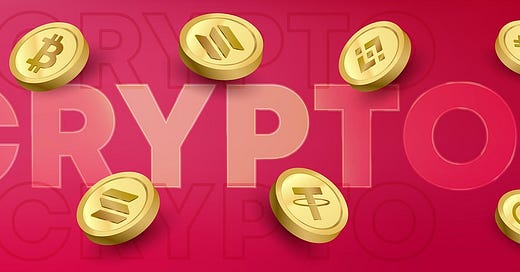Bonus post - regular one is Thursday and this week will be about EVs
Everybody knows a little about Bitcoin (BTC).
And the 2nd most well known crypto is Ethereum (ETH).
Solana (SOL) is less well known, but it’s challenging ETH as the predominant platform for decentralized contracts and projects. Today’s topic is to compare ETH and SOL.
But first, a little more about BTC.
BTC is a cryptocurrency that can be used like money, but it’s not widely used that way, at least not yet.
It’s a non-inflationary store of value, like gold, so most BTC holders use it more as a store of value than for transactions. The reason it’s non-inflationary is because the total number of coins is limited by the blockchain software that it’s built on. No more coins can be printed beyond that contractual limit, and we’re already quite close to the limit. No government controls it, it’s global, and no one can inflate it by ‘printing’ more of it.
Of course, how much value BTC has is an open question. If for some reason it should fall out of favor, its value could go to zero. On the other hand, if it becomes more widespread, its value could continue to go way up. So it’s still speculative and volatile.
The main reason BTC isn’t used very much for transactions is that it’s slow. Confirming a transaction on the blockchain typically takes about 10 minutes. Imagine waiting in line at the grocery store for each person in line takes 10 minutes to pay.
Another reason for its limited use is that each transaction costs something. The cost varies, but as I write today, the average cost is about $1.20 in the dollar value of BTC. So it wouldn’t make much sense for small transactions like buying lunch or coffee.
ETH is a cryptocurrency token, but its use is designed for the Ethereum platform. Ethereum is a little like a computer’s operating system. For example, MS Office is a group of software apps or programs that are built on the MS operating system, Windows. Ethereum supports apps, or projects, like ‘smart contracts’, and ETH is the coinage for those projects.
The problem with ETH is similar to BTC – there is a time factor and a cost factor for every transaction. The cost of ETH transactions is determined like an online auction, so at times of high demand, it can get expensive – like $25!
Solana is a competitor of Ethereum. It too is a platform for developing decentralized blockchain projects. Its advantage is speed and relative cheapness.
That’s my oversimplified summary. Now for a real, rather amazing, illustrated and thorough explanation of the difference between Solana and Ethereum, thanks to this great 10 minute youtube video:
“What is Solana? SOL explained with animations”
Enjoy.






Thanks AL,
I appreciate your breadth of interests. 👍🏻
At this point I think Bitcoin is one of the few cryptos with staying power. By using lightning, you can make transactions smaller and cheaper, but it isn't quite as secure, so not the best for large transactions or a store of value. Lightning is being used on platforms like Nostr (distributed social media) and Fountain (audio podcast app) to give small amounts (even less than a penny) to content providers. It works great and is built upon Bitcoin.